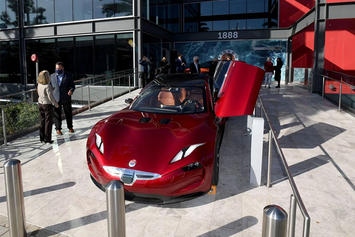
If Fisker ends up building electric vehicles with Foxconn Technology Group in Wisconsin, as seems likely, the stunning new development could make a huge winner out of what was an economic-development disaster — and put the state back into the business of making cars for the first time in 13 years.
Such a development also would continue a carve-out by Flyover Country of an increasingly significant role in the EV future of automotive transportation.
America’s slow transition to all-electric automobiles has been driven by the extreme anti-emissions dictates of the state government of California, and as it succeeds, this push continues to imperil jobs in our region from the fracking fields of the Great Plains to the engine plants of Michigan.
But the traditional home of America’s auto industry, the Midwest, has been pushing back, too. For example, the manufacturing linchpin of GM’s planned transition to all-electric light vehicles is a plant in Hamtramck, Michigan, straddling the border of Detroit. And one of the hottest EV startups, Rivian, will build its widely anticipated all-electric SUVs and pickup trucks in an abandoned Mitsubishi plant in Normal, Illinois.
Also to the broader region's credit, add Elon Musk's decision to put Tesla's next plant, for building pickup trucks, in Texas, spurning the San Francisco Bay Area where his company already makes autos in part because he doesn't get along with local governmental authorities.
That’s not to mention all the development work proceeding on EVs at Flyover Country facilities by the Detroit Three automakers as well as Toyota, Hyundai and others.
Right now, the focus is on Foxconn and Fisker. The world’s largest contract electronics manufacturer and a key assembler of iPhones for Apple, Foxconn has agreed to make cars for EV startup Fisker, and Fisker CEO Henrik Fisker told the Wall Street Journal that the vast site of Foxconn’s factory project in Wisconsin is “an obvious one” for making the cars.
“They’ve got a factory there and quite a lot of land with quite a lot of possibility for expansion,” Fisker told the newspaper, while saying that the new partners “haven’t made a final decision on that.”
As I just wrote for Forbes, Wisconsin once was a force in the automotive industry, joining with other states adjacent to the Great Lakes to help form the most formidable car-making belt in the world. But General Motors closed its assembly plant in Janesville, Wis., in 2008, after making automobiles there since 1923, and Chrysler closed an ancient assembly plant in Kenosha, Wis., in 1988, then shuttered its engine plant in Kenosha in 2010.
A Fisker EV-making plant in Mount Pleasant, Wisconsin, Foxconn’s site in the southeastern corner of the state, would marry in a spectacular way two enterprises that have been stumbling for a while. Los Angeles-based Fisker is the second EV startup founded by Fisker, whose first carmaking enterprise, Fisker Automotive, ended with selling its hard assets to China’s Wanxiang Group in 2014. Fisker’s new company plans to start production on its first vehicle, the Ocean electric SUV, by the end of next year.
Read the rest of this piece at The Flyover Coalition.
Dale Buss is founder and executive director of The Flyover Coalition, a not-for-profit organization aimed at helping revitalize and promote the economy, companies and people of the region between the Appalachians and Rockies, the Gulf Coast and the Great Lakes. He is a long-time author, journalist, and magazine and newspaper editor, and contributor to Chief Executive, Forbes, the Wall Street Journal, the New York Times and many other publications. Buss is a Wisconsin native who lives in Michigan and has also lived in Texas, Pennsylvania and Florida.
Image: Flyover Coalition.













Flyover advantages
What are the comparative advantages for the Flyover jurisdictions cited here, beyond available land/factory structures? Lower-cost skilled labor? Transport networks? Power rates? Tax breaks?